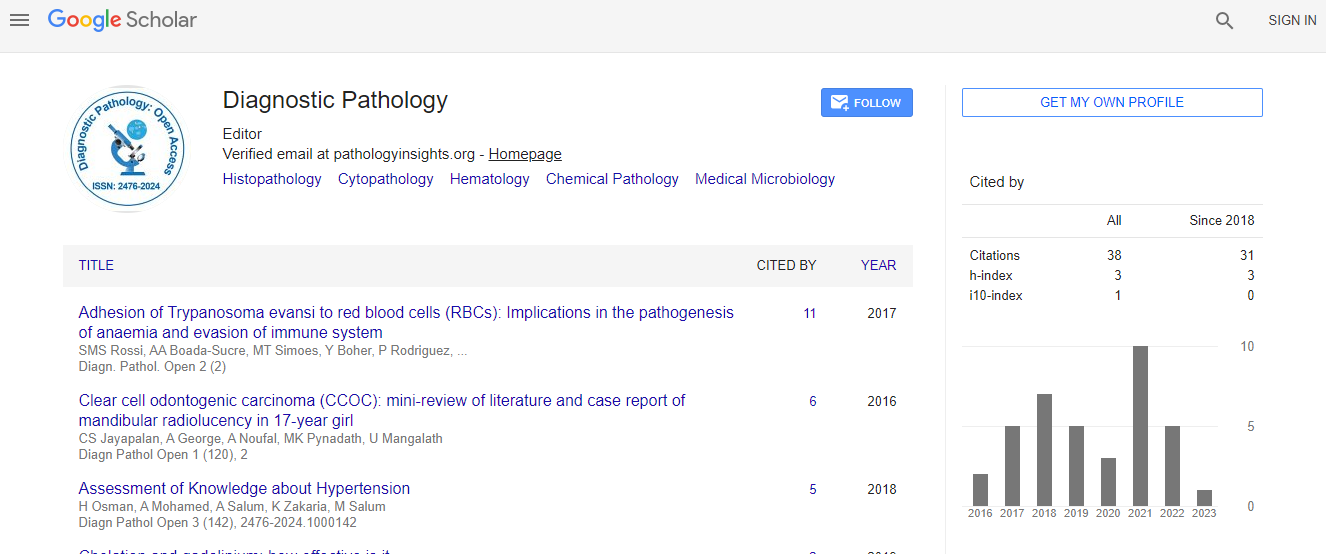Our Group organises 3000+ Global Conferenceseries Events every year across USA, Europe & Asia with support from 1000 more scientific Societies and Publishes 700+ Open Access Journals which contains over 50000 eminent personalities, reputed scientists as editorial board members.
Open Access Journals gaining more Readers and Citations
700 Journals and 15,000,000 Readers Each Journal is getting 25,000+ Readers
Google Scholar citation report
Citations : 110
Diagnostic Pathology: Open Access received 110 citations as per Google Scholar report
Diagnostic Pathology: Open Access peer review process verified at publons
Indexed In
- Google Scholar
- RefSeek
- Hamdard University
- EBSCO A-Z
- Publons
- Euro Pub
- ICMJE
Useful Links
Share This Page
Application of modular chemoenzymatic conjugation strategies for the semi-rational engineering of biologicals
13th International Conference on Laboratory Medicine & Pathology
Christoph Hiemenz
Ruprecht Karls-University Heielberg, Europe
ScientificTracks Abstracts: Diagn Pathol Open
Abstract
Binder drug conjugates such as antibody drug conjugates have led to major improvements of personalized therapy of diseases such as cancer, autoimmunity and pathogenic virulence. The underlying methods which enable the position specific functionalization or semi-rational mutagenesis of bioactive proteins have been the key innovations. While academic research groups are already managing to computationally design small bioactive peptides, the majority of protein engineering projects are still relying on semi-rational directed evolution to identify protein with desirable properties. Here a main leap forward has been the site-directed post-translational mutagenesis of proteins by means of state-of-the art bioconjugation methods including enzymatic sortase A transpeptidation and chemical indium catalyzed mild radical addition of diverse iodoalkanes to sp2-hybridized amino acids. Above all, a multitude of chemoenzymatic functionalization methods are continuously being improved and are fully compatible with directed evolution via cell surface display library screeningsBiography
Christoph Hiemenz has completed his MSc from Ruprecht-Karls University Heidelberg. He work as a bioinformatician at PEPperPRINT GmbH and is the scientific instructor of the iGEM Team Heidelberg 2019. He has worked on diverse research projects: -DKFZ Heidelberg, Prof. Jörg Hoheisel- Kinase activity profiling with peptide arrays -BioQuant Heidelberg, Prof. Roland Eils/Prof. Barbara Di Ventura- Optogenetic nuclear protein shutteling and ODE modeling -KTH Stockholm, Prof. Stefan Ståhl – Surface functionalization of E.coli cells via sortases and inteins - EMBL Heidelberg, Dr. Carsten Schultz- Bioactivity of trifunctional Sphingolipids -IPMB Heidelberg, Prof. Andres Jäschke- Multivalent fluorescent turn-on probes for RNA imaging.

 Spanish
Spanish  Chinese
Chinese  Russian
Russian  German
German  French
French  Japanese
Japanese  Portuguese
Portuguese  Hindi
Hindi 
